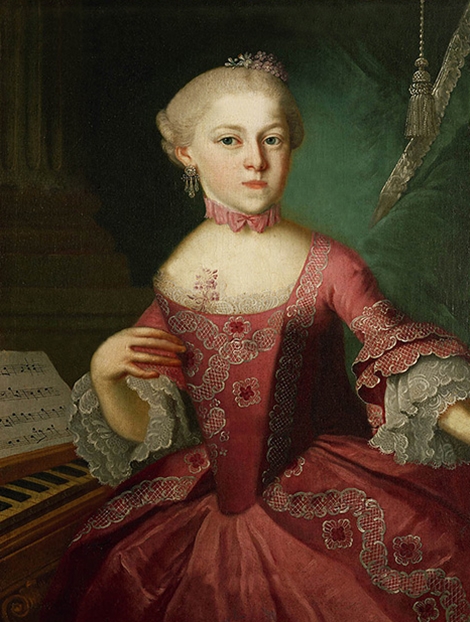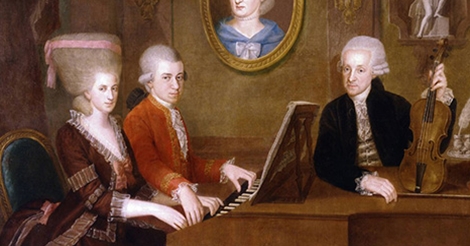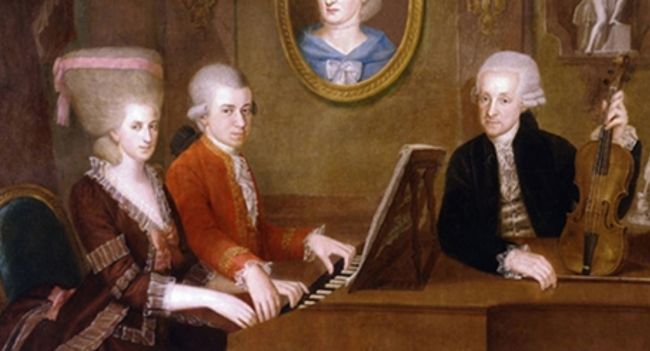The world would have had another musical genius like Mozart, even more talented, if this genius had not been a woman and was forced to stop pursuing music and take care of housework and finances. get married. That is Mozart’s older sister Maria Anna.
According to experts, Mozart’s older sister was considered as talented as her younger brother Wolfgang Amadeus and her musical talent was praised throughout Europe.
Musical childhood
The Mozart sisters’ father, Leopold Mozart, a court composer, began teaching Maria Anna to play the harpsichord when she was 8 years old while her 3-year-old brother sat beside her. During the 1760s, she traveled throughout Europe as a pianist, performing in Germany, Austria, London (England), Paris (France), the Netherlands and Switzerland. The public uses words like master artist, prodigy, and genius to describe Maria Anna.
Mr. Leopold wrote in a letter in 1764: “My little daughter plays the most difficult pieces we have with unbelievable precision and excellence. That means my little daughter is one of the most skilled artists in Europe even though she is only 12 years old.
The Mozart sisters traveled around Europe performing, stopping in 88 cities over the course of 3 years. In 1762, two sisters, Mozart Maria, who was only 11 at the time and her brother who was only 6 years old, had the opportunity to play music in front of a group of aristocrats in Munich.
One person present at the time, Count Karl von Zinzendorf, wrote his thoughts in his diary: “The boy from Salzburg and his sister played the harpsichord. He played wonderfully. The boy was a spirited, lively, attractive child. The boy’s older sister performed like a master and was praised by his younger brother”.
 |
| Maria Anna. |
The Mozart sisters spent a pleasant childhood, immersed in music and creating their own childhood kingdom. The two sisters are very close. They also created their own secret language and the “Back Kingdom” fantasy in which they are king and queen. Mozart even wrote in his sister’s diary.
When the musical talents of sisters Maria Anna and Mozart flourished, both moved to the stage of composing music, Mozart greatly admired his sister and encouraged her works. In 1770, Maria Anna sent a piece of music she composed to her younger brother and Mozart wrote back to her: “Dear sister. I’m in awe because you can compose so well and the music you write is so good”. Sadly, that piece of music, as well as other pieces composed by Maria Anne, are no longer in circulation.
The dream fades
Once, at a concert, Mozart proudly announced that the piece he had just performed was written by his sister. However, Mr. Leopold was furious. He ordered Maria Anna never to compose music again because in the 18th century, women did not work as composers.
After that, Mr. Leopold devoted all his attention to Mozart. He did not let Maria Anna learn to play the violin and compose music. He told Maria Anna that she had to stay home while he took Mozart on tour and that she had to teach piano to students from rich families to get money for her younger brother’s tours in Italy.
At home, Maria Anna still composed music while her father and younger brother toured throughout Italy. Later, Mr. Leopold stopped allowing Maria Anna to tour when she turned 18 years old to get married. The girl’s dream was broken, she agreed with her father but suffered from severe depression.
The relationship between Maria Anna and her younger brother was therefore overshadowed after many years of separation and due to the favoritism that Mr. Leopold had towards his son. Maria Anna suffered not only because her dream did not come true, but also because of the growing distance between her and her younger brother and father – who did not recognize her daughter’s talent because society did not allow women to become composer.
Even the people that Maria Anna wanted to choose as her husband were all rejected by Mr. Leopold. She fell in love with a captain named Franz d’Ippold but was forced to refuse his proposal because her father did not agree. Mozart once tried in vain to help his sister marry her lover, but it was also in vain.
Finally, in 1784, she married a judge named Johann Baptist Franz von Berchtold zu Sonnenburg and moved to St. Gilgen lives. This place is 29 km from Mozart’s family home in Salzburg. Mr. Berchtold was a widower twice and had five children with his two previous wives. Maria Anna helped her husband raise their own children. After that, Maria Anna returned home to the city of Salzburg to give birth to her first son and left him in the care of his grandfather. She gave birth to three children including Leopold Alois Pantaleon (1785-1840), Jeanette (1789-1805) and Maria Babette (1790-1791).
As for Maria Anna’s first child, Leopold named him after his grandfather. She let her father take care of her first child according to his wishes. Mr. Leopold said he wanted to raise the child for the first few months. In 1786, he changed his mind and wanted to raise his grandchildren indefinitely. He seemed happy to see his grandson develop every day, from toilet habits, speaking… His grandson also started his first music lessons from his grandfather. Maria Anna occasionally saw her son but generally did not participate in his care. Her son stayed with his grandfather until his death in 1787.
Maria Anna grew increasingly distant from her younger brother, especially after Mozart married Constanze Weber. They only communicated for a short time after Mr. Leopold passed away, after which the sisterly feeling disappeared. Mozart’s short letters to his sister were almost exclusively about the division of his father’s assets. When Mozart died at the age of 35, Maria Anna awoke from her long sleep and sought to honor her younger brother. She collected all the music composed by her younger brother and built a memorial in his memory.
 |
| Mr. Leopold (right) with his two children Maria Anna (left) and Mozart (center). |
After her husband passed away. She returned to the city of Salzburg with her children to earn a living as a piano teacher. In the last years of her life, her health gradually declined and she became blind in 1825. British writer Mary Novello once visited her, in 1829, and commented: She had become “slow, exhausted, weak and almost silent, alone”. At first, the writer thought Maria Anna’s family was poor, but in reality it was because she lived a simple life. When she died, she left behind a large fortune.
Maria Anna died on October 29, 1829 at the age of 78 and was buried in St. Peter. Two centuries after Mozart’s death, the name Maria Anna could have become a bright star in the musical sky but is only a small trace in Mozart’s biography simply because of social prejudice.
“Another Mozart”
Maria Anna’s life was made into the play “Another Mozart” (According to Other Mozart) by Ms. Sylvia Milo and premieres this November in New York. According to author Milo, she never knew Maria Anna until she visited Mozart’s house in Vienna and saw a painting of the great composer’s two sisters. She said: “I immediately noticed when I saw a woman sitting next to Mozart who looked like two equals. But the things this girl composes cannot exist. To me it’s a story that needs to be told”.
According to Ms. Milo, Mozart’s family risked everything, borrowing money to find a way to promote Mozart’s image so that they could rely on the young man in the future. Author Milo believes that Mr. Leopold’s decision is completely reasonable for the survival of the family. In the play, Mrs. Milo does not blame Mr. Leopold at all. However, of course society was like that at that time, there were female composers but those who could present their works had to be from the aristocracy. Women have to play music without pay. If they made money from music, they would be considered prostitutes. That was not Maria Anna Mozart’s position.
Regarding the influence that Maria Anna may have had on Mozart, author Milo said: “Maria Anna copied Mozart’s compositions when her younger brother was too young to write. Therefore, it is possible that some of Mozart’s music belonged to his sister. We also know that when Mozart was in London composing his first symphony, Maria Anna copied it for her younger brother and arranged it for him. It is not known to what extent the two sisters cooperated, only that Maria Anna is a talented composer”.
Mr. Stevan Jackson, a musical sociologist and anthropologist at Radford University in Virginia, commented: “Being born into a musical family with a musical sibling, that can can help stimulate one’s passion for music. In Mozart’s case, his father was a court composer and his sister studied music from a young age. Watching his father teach his sister music made Mozart love music and want to be like her. From a young age, little Mozart considered his older sister an idol, so he was probably influenced and had a passion for music from then on.
